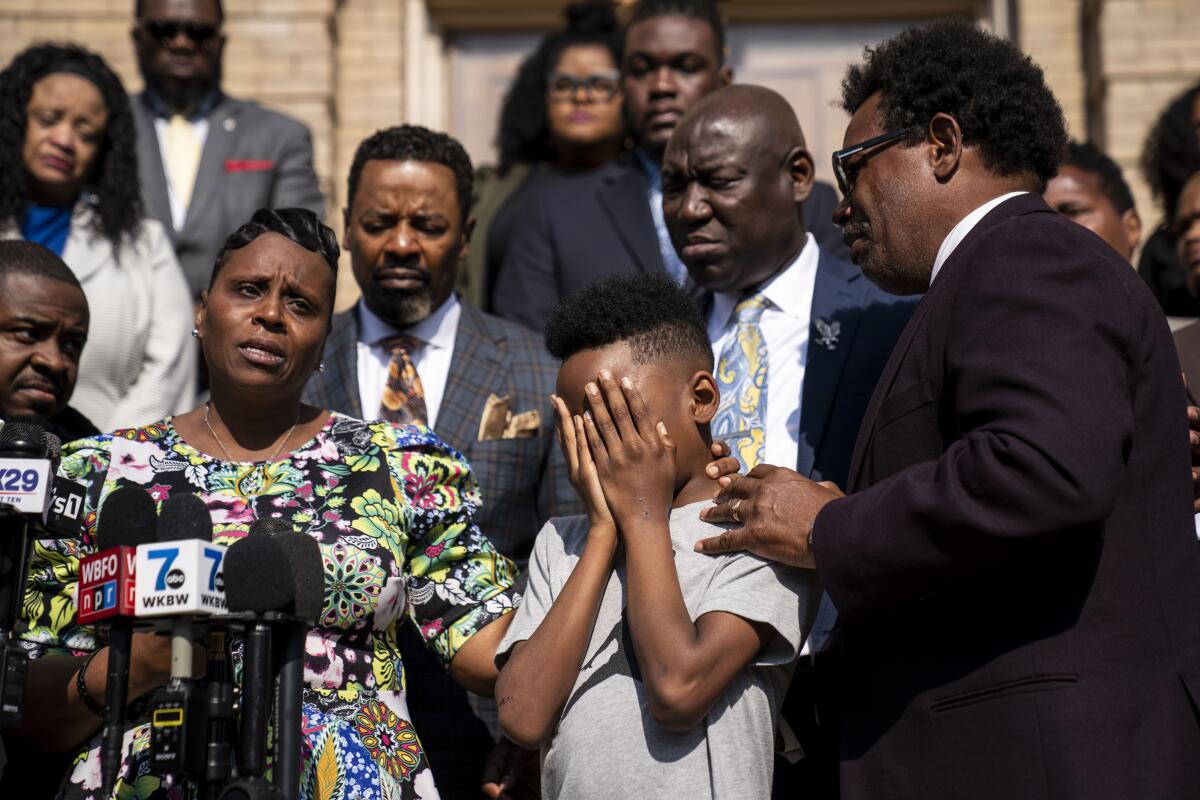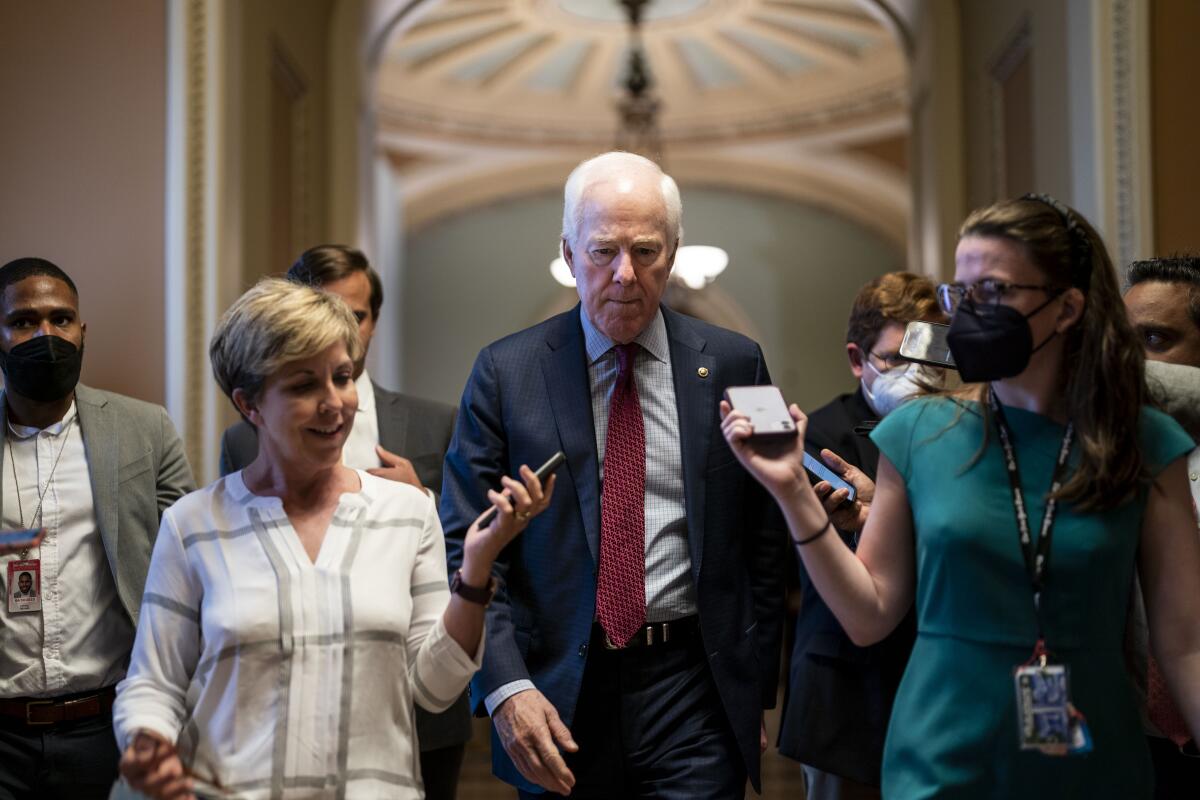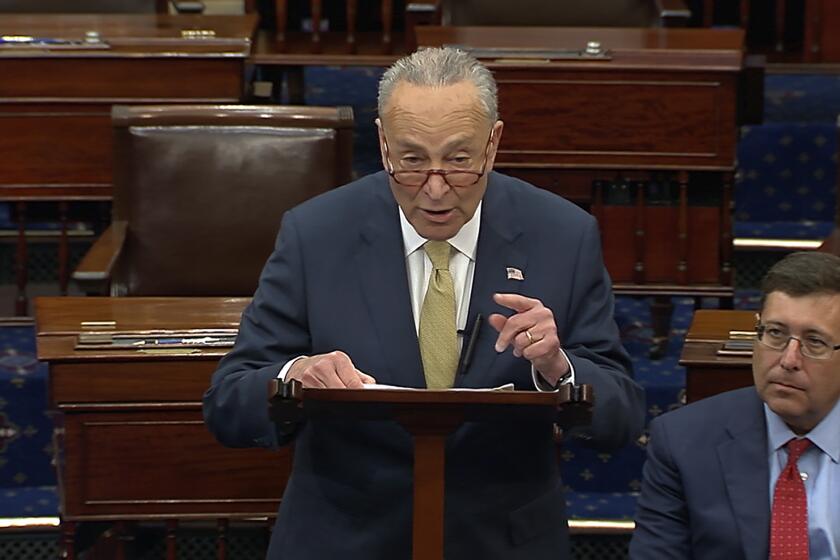Son of Buffalo victim pushes Congress: ‘What are you doing?’

The son of an 86-year-old woman killed in the Buffalo mass shooting is calling on Congress to act against domestic terrorism.
- Share via
WASHINGTON — The son of Ruth Whitfield, an 86-year-old woman killed when a gunman opened fire in an attack on Black shoppers in Buffalo, N.Y., challenged Congress on Tuesday to act against the “cancer of white supremacy” and the nation’s epidemic of gun violence.
Garnell Whitfield Jr.’s emotional testimony comes as lawmakers are working furiously to strike a bipartisan agreement on gun safety measures in the aftermath of back-to-back mass shootings. Ten days after the shooting killed 10 in New York, another gunman with a semiautomatic rifle opened fire in Uvalde, Texas, killing 19 schoolchildren and two teachers.
“What are you doing? You were elected to protect us,” Whitfield Jr. told members of the Senate Judiciary Committee.
“Is there nothing that you personally are willing to do to stop the cancer of white supremacy and the domestic terrorism it inspires?” he asked. “If there is nothing then, respectfully, senators … you should yield your positions of authority and influence to others that are willing to lead on this issue.”
The hearing is the first of two this week as families of the victims and survivors of the mass shootings in Buffalo and Uvalde appear at public hearings and events on Capitol Hill to show the human toll of America’s gun violence and urge Congress to act.
Pressing for a deal, President Biden met Tuesday with Sen. Christopher S. Murphy, a key Democratic negotiator, who has worked to pass gun-control legislation since the slaughter of 20 children at Sandy Hook Elementary in his home state of Connecticut a decade ago.

As a bipartisan group of senators is trying to find a compromise on gun legislation, the GOP blocks discussion of a bill to fight domestic terrorism.
Murphy told reporters after the meeting that he was grateful to have an opportunity to update the president on the talks in the Senate. “Obviously we’ve still got work to do in the Senate,” he said.
Murphy said his goal is to try to get an agreement this week, but he added that Senate Majority Leader Charles E. Schumer has been clear that “we need some extra time to dot the i’s and cross the t’s that will get it.”
On Wednesday, the House Oversight Committee is expected to hear from more victims’ families and from fourth-grader Miah Cerrillo, who captured Americans’ attention after she described covering herself in her dead classmate’s blood and playing dead to survive the shooting rampage in Uvalde.
The Senate hearing Tuesday focused directly on the white supremacist ideology that authorities say led an 18-year-old gunman dressed in military gear to drive hours to a predominately Black neighborhood in Buffalo and livestream his violent rampage. The shooting left 10 people dead and several others wounded.
“My mother’s life mattered,” Whitfield said. “Your actions here will tell us if and how much it mattered to you.”
Shortly after the Buffalo massacre, a bill that would have bolstered federal resources to prevent domestic terrorism failed in the Senate at the hands of Republican opposition. Even at Tuesday’s hearing, Republican senators took the time to focus on the racial injustice protests that took place in the summer of 2020, citing those incidents as acts of domestic extremism.

Since the failed vote, senators have regrouped and began to meet privately in a small bipartisan group headed by Murphy and Republican Sen. John Cornyn of Texas, trying to hash out a compromise that could actually become law.
But lawmakers have been here before — unable to pass any substantial gun safety laws in decades in the face of steep objections from Republicans in Congress, some conservative Democrats, and the fierce lobby of gun owners and the National Rifle Assn. No major legislation has made it into law since the 1994 assault weapons ban, which has since expired.
The package under discussion is far short of the sweeping measures for an assault weapons ban or universal background checks that are popular with Americans and advocated by gun safety groups, but rejected by Republicans.
Payton Gendron’s hometown lies in a region where extremism is seeping into the mainstream. “It’s an awful way to get our name on the map,” one resident said, referring to the Buffalo massacre Gendron is accused of committing.
Instead, the senators are focusing on incremental policy changes through a system that would send funds and other incentives to the states to bolster security at school campuses, provide more mental health services to young people and possibly encourage states to pursue red-flag laws to keep firearms out of the hands of people who would do harm.
“I’m optimistic we can get 60-plus votes — but the question is what that package looks like,” Cornyn told reporters as lawmakers arrived back in town Monday from a week-long recess.
Cornyn was referring to the 60-vote threshold needed in the 50-50 Senate to advance legislation past a filibuster that can block most any bill.
The Texas senator said he was preparing to brief his colleagues Tuesday, at their weekly Senate lunch, on the status of negotiations. But he warned Democrats off rushing the process, saying “arbitrary deadlines” are no help in the talks.

While senators are reluctant to raise the age requirement for gun purchases from 18 to 21, as has been done in some states, an alternative idea surfacing is to open the records of juvenile offenders to look for problem spots before allowing adults to purchase weapons.
Murphy said that Cornyn has articulated a legitimate concern that many times law enforcement doesn’t have access to juvenile records when making a decision on a background check.
“That clearly seems like something we should fix and address,” Murphy said. “That’s certainly a part of our talks. It’s complicated because different states have different rules when it comes to juvenile records.”
The proposals are gaining traction, but also raising concerns from Democrats and some advocacy groups who are pushing senators to do more, faster, to stem the tide of mass shootings.
More to Read
Sign up for Essential California
The most important California stories and recommendations in your inbox every morning.
You may occasionally receive promotional content from the Los Angeles Times.















